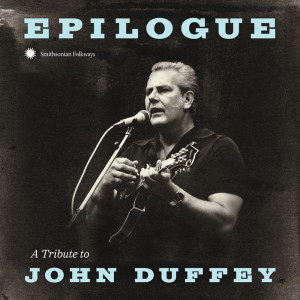 You can always trust Smithsonian Folkways to do up a package of music the right way. That definitely applies to this standout tribute to one of the fathers of contemporary bluegrass, John Duffey.
You can always trust Smithsonian Folkways to do up a package of music the right way. That definitely applies to this standout tribute to one of the fathers of contemporary bluegrass, John Duffey.
Duffey was a founding member of both The Country Gentlemen and The Seldome Scene, two of the most important groups in the history of modern bluegrass. He was a world-class mandolin player and sang a powerful tenor that was a perfect vocal counterpoint to the baritone leads of both groups. His mandolin playing and the mandolins he built after he became a luthier brought him the most notice. He died of a heart attack in 1996.
Both groups were notable for the way they helped bring bluegrass in from the wilds, so to speak, making it a little more compatible with the tastes of mainstream country fans. One of the songs that was most instrumental in that process was “Bringing Mary Home,” which Duffey co-wrote and sang lead on, and which became a crossover country hit. It’s based on a ghost story that’s common to many cultures in which a traveler picks up a person (in this case a child) who needs a ride home, but when he gets to the home the person disappears. A family member, usually the mother, informs the traveler that this is the anniversary of that person’s death on that very road, usually in the very spot where they were picked up.
Needless to say, “Bringing Mary Home” has a place of honor as the final track on Epilogue, sung by John Starling and featuring other current and former Seldom Scene members plus Eddie Adcock, another original Country Gentlemen member.
It’s a fine if sentimental ballad, but not my favorite on this disc. But my, there are too many great tracks to choose from, with so many world-class players and singers. The first one that jumped out at me was the rollicking instrumental “Sunrise” with Sam Bush on mandolin and Bela Fleck on banjo, a couple of my favorite roots players. Man, Bela and Sam put on a show! The very next track is top-notch, too, an early Country Gentlemen song “Going To The Races,” that they got via Carter Stanley; just top-notch bluegrass with three-part harmony vocals from James King, Lou Reid and Eddie Adcock.
Tim O’Brien nails the old murder ballad “Poor Ellen Smith,” another one where Fleck plays banjo. Jerry Douglas plays some sweet Dobro licks on the old Louvin Brothers favorite “Ain’t Gonna Work Tomorrow, with Marc MacGlashan playing one of Duffey’s old mandolins. And because this disc was so long in the making, we get the late, great Mike Auldridge as well as Fred Travers, both of The Seldom Scene, on Dobro accompanying Bruce Molsky who plays guitar on a very nice arrangement of “Chim-Chim-Cher-Ee.”And there’s lots more, a total of 16 tracks.
Major props for this project go to Japanese-born mandolinist Akira Otsuka, who was a fan of Duffey’s since the mid-1960s when he was learning to play. He pulled this project together from the beginning and shepherded it through to completion over several years. But again, a lot of credit to Smithsonian Folkways for this excellent package. The accompanying 40-page booklet has extensive notes on each track, lots of photos, and essays by Dudley Connell (of the Seldom Scene) and Kate Daley, plus notes from producer Otsuka as well as his essay about Duffey’s two main mandolins. It’s obvious that the bluegrass world held John Duffey in high esteem, and this package ought to set modern fans of the music off in search of the original recordings.
You can sample every track on the Folkways webpage for this album.
(Smithsonian Folkways, 2018)
